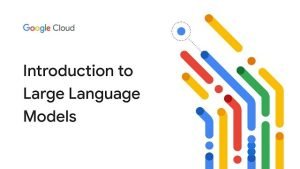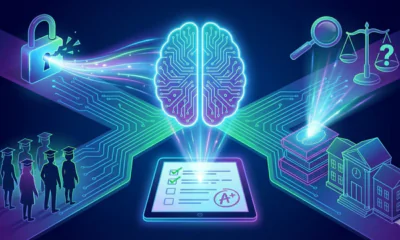Artificial Intelligence
Learn Generative AI With Google

The Artificial Intelligence (AI) ecosystem has evolved rapidly in the last five years, with Generative AI (GAI) leading this evolution. In fact, the Generative AI market is expected to reach $36 billion by 2028, compared to $3.7 billion in 2023.
Today, Generative AI is affecting many industries, such as healthcare, marketing, fashion, and entertainment because AI generators like AI image generators and AI video generators have shown us the potential to substitute manual human tasks. However, advancing in this field requires a specialized AI skillset.
So, to make learning easier for AI enthusiasts, Google has launched 10 free courses for Generative AI. Before we discuss them, let’s see briefly what generative AI is.
What is Generative AI & Why is Learning Generative AI Important?
Generative AI is a specialized AI domain that focuses on building models that can generate new realistic content, like images, text, audio, or videos, using existing data samples.
For instance, models like ChatGPT and DALL-E are prominent examples of Generative AI as we are now observing their real-world applications. ChatGPT is integrated into Bing’s search engine, whereas the Edge browser now incorporates DALL-E.
As Generative AI evolves, staying up-to-date with this technology has become crucial for several reasons:
- Ensures business productivity, cost-effectiveness, and increased efficiency.
- Encourages experimentation and creativity.
- Supports human-AI collaboration and augments human capabilities.
- Allows innovative problem-solving strategies.
Now, let’s look at how Google is helping learners study Generative AI.
Google’s 10-Course Generative AI Learning Path
1. Introduction To Generative AI
Course difficulty: Beginner-level
Completion time: ~ 45 minutes
Prerequisites: No
What will AI enthusiasts learn?
- What is Generative Artificial Intelligence, how it works, what its applications are, and how it differs from standard machine learning (ML) techniques.
- Covers Google tools for creating your own Generative AI apps.
- You’ll also learn about the Generative AI model types: unimodal or multimodal, in this course. Unimodal systems take only one input type, whereas multimodal systems can take more than one input type.
2. Introduction to Large Language Models
Course difficulty: Beginner-level
Completion time: ~ 45 minutes
Prerequisites: No
What will AI enthusiasts learn?
- This course explores LLMs (Large Language Models) – AI models trained on large amounts of textual data. “Google’s Bard AI” is an excellent example of an LLM that makes advanced human-machine interaction possible.
- Understand how LLMs are used for sentiment analysis.
- Learn about prompt tuning, through which the prompts given to a language model are refined to achieve the desired output.
- Cover the tools that Google provides for the development of Gen AI.
3. Introduction to Responsible AI
Course difficulty: Beginner-level
Completion time: ~ 1 day (Complete the quiz/lab in your own time)
Prerequisites: No
What will AI enthusiasts learn?
- What is Responsible Artificial Intelligence? Why it’s important, and how Google implements this technology in its products.
- An introduction to the 7 Responsible AI principles of Google.
4. Generative AI Fundamentals
Course difficulty: Beginner-level
Completion time: ~ 1 day (Complete the quiz/lab in your own time)
Prerequisites: No
What will AI enthusiasts learn?
- Contains all the content from the previous three courses.
- Includes a final quiz through which you can show your understanding of the fundamental concepts of Generative AI.
5. Introduction To Image Generation
Course difficulty: Beginner-level
Completion time: ~ 1 day (Complete the quiz/lab in your own time)
Prerequisites: Knowledge of ML, Deep Learning (DL), Convolutional Neural Nets (CNNs), and Python programming.
What will AI enthusiasts learn?
- In this course, you will discover diffusion models, their working, and implementation.
- Understand what unconditioned diffusion models are.
- Improvements in text-to-image diffusion models.
- Training and deploying these models on Vertex AI – a fully managed ML platform by Google.
6. Encoder-Decoder Architecture
Course difficulty: Intermediate-level
Completion time: ~ 1 day (Complete the quiz/lab in your own time)
Prerequisites: Knowledge of Python programming and TensorFlow.
What will AI enthusiasts learn?
- Discover the key components of the encoder-decoder architecture.
- Understand how to use the encoder-decoder architecture to train a model and produce text from it.
- Includes a lab walkthrough where you will code in TensorFlow, a popular ML development platform to build production-grade models.
7. Attention Mechanism
Course difficulty: Intermediate-level
Completion time: ~ 45 minutes
Prerequisites: Knowledge of ML, DL, Natural Language Processing (NLP), Computer Vision (CV), and Python programming.
What will AI enthusiasts learn?
- Discover the concept of attention mechanism – a powerful approach that enables language models to concentrate on particular input sequence segments in order to understand contextual information.
- Learn how it operates and its uses.
- Understand how the attention mechanism is applied to ML models.
8. Transformer Models & BERT Models
Course difficulty: Beginner-level
Completion time: ~ 45 minutes
Prerequisites: Intermediate knowledge of ML, understanding of word embeddings and attention mechanism, and experience with Python and TensorFlow.
What will AI enthusiasts learn?
- Learn about the Transformer architecture and explore how a Bidirectional Encoder Representation from the Transformer (BERT) model is built using Transformers.
- Covers the different NLP tasks for which a BERT model is used.
9. Create Image Captioning Models
Course difficulty: Intermediate-level
Completion time: ~ 1 day (Complete the quiz/lab in your own time)
Prerequisites: Knowledge of ML, DL, NLP, CV, and Python programming.
What will AI enthusiasts learn?
- How to identify the elements of an image captioning model.
- How to build and assess a model for image captioning.
- How to create your own captioning models for photos and use them to create captions.
10. Introduction To Generative AI Studio
Course difficulty: Introductory-level
Completion time: ~ 1 day (Complete the quiz/lab in your own time)
Prerequisites: No
What will AI enthusiasts learn?
- Recognize the purpose of Generative AI Studio, a Vertex AI product.
- The options and properties of Generative AI Studio are also covered in this course.
- Contains a hands-on lab where you can utilize this tool.
After completing these ten free courses, learners can have a comprehensive understanding of Generative AI and its practical applications. Learners can utilize their newly acquired knowledge to advance the field of Generative AI, building innovative products that can positively impact our society.
“In a world where ChatGPT and other AI apps can do many things humans once needed to do themselves or needed to hire other humans to do, the question of ‘how will I add value?’ becomes more relevant than ever.” ― Hendrith Vanlon Smith Jr, CEO of Mayflower-Plymouth, in his book Business Essentials.
To keep yourself updated about AI advancements, visit unite.ai.






















